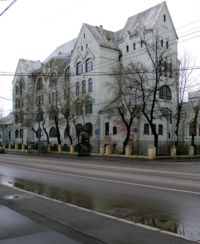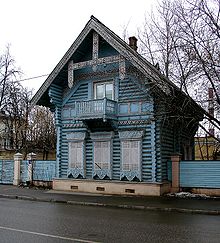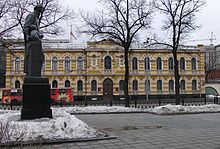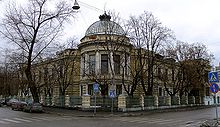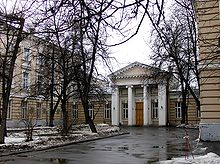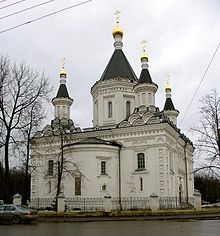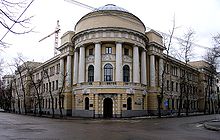- Devichye Pole
-
Devichye Pole (Russian: Девичье Поле, Maiden's Field) is a historical medical campus, built in 1887-1897 in Khamovniki District of Moscow, Russia, to the master plan of Konstantin Bykovski. It is located between the Garden Ring and Novodevichy Convent.[1] Originally the medical department of Moscow State University, it is now split between Moscow Medical Academy, Russian State Medical University and various state and private clinics. The territory also includes Russian State Archives and Devichye Pole park.
Contents
History
This section is based on "Church of Archangel Michael, Devichye Pole" by Yelena Lebedeva[2]
Early history
Devichye Pole acquired its name from Novodevichy Convent (established 1524). In 17th century, it housed a court garden for medicinal herbs, and later the court of Eudoxia Lopukhina, estranged first wife of Peter I. Thus, the main street (now Bolshaya Pirogovskaya) was called Tsarytsinskaya. In late 18th century, Trubetskoy, Apraksin and other families set their country estates in Devichye Pole; the place remained a quiet country until 1880s.
One notable building was the wooden Pogodinskaya Cottage (1856, architect Nikolay Nikitin), owned by historian Mikhail Pogodin, once the center of Moscow literary elite. Extant building is actually a side wing of a larger wooden estate. In 1882-1886, Tsaritsynskaya street acquired a two-story Archive Building, now the exhibition hall of Central Archive of Ancient Acts.
Medical Campus, 1884-1897
This section is based on "History of the Clinical Town on Devichye Pole"[3]
Need for new hospitals for the public and training facilitied for Moscow State University was imminent since 1870s. Proposals by professor Novatsky (1873) and Varvara Morozova (1882) were left unfulfilled, but in 1884 the initiative of professor Nikolay Sklifosovskiy was approved by the City Hall. City issued free land in Devichye Pole (originally, 18 hectares [4]), national government set aside 2 million roubles, the rest came from private sponsors (notably, Morozov, Khludov and Shelaputin families). University board picked Konstantin Bykovsky by internal vote, instead of a public contest, saving time and ensuring architect's dependence. Professors Alexander Makeyev, Fyodor Erismann, Vladimir Snegirev and Nikolay Sklifosovskiy and Bykovsky formed the project management board. In 1884-1885, Bykovsky, Erismann and Snegirev travelled Europe, inspecting the best institutions of their time. Master plan was ready by the end of 1885, but the national government released its share 2.15 million roubles only in July 1887. Thus, state-funded construction lagged behind private-funded clinics.
The campus was lined along Bolshaya Tsaritsynsksya (now Bolshaya Pirogovskaya) Street, with state-funded clinics on the right (north) side and privately-funded clinics on the left. This explains the difference in architecture - right side is uniformly Neoclassical, left side varies from pure Palladian architecture to Beaux Arts and Russian Revival fantasies.
Construction of the first stage, launched in 1887, was generally completed by 1892 under general management of architect Konstantin Bykovsky (1841–1906). Bykovsky personally designed most of state-funded buildings. Additions were being built continuously after this date, most notably Roman Klein-designed Gynecology Institute (1896) and Pirogov monument by Vladimir Sherwood (1897). The project was unique to Russia and widely praised overseas: for the first time in national history, a large medical institution was designed and built with virtually no limitation in funds and land, so Bykovsky provided a generous margin for future expansion.
The first clinic to be opened was a psychiatric clinic funded by Varvara Morozova (1886), now remembered partly by the Pyotr Gannushkin working there. This was followed by professor Snegirev's Gynecology clinic in 1889, funded by Morozov and Nosov families. This clinic was later built out from two to four-story, Snegirev monument by Sergey Konenkov installed in 1967. Other privately-owned clinics followed, some linked to personal tragedies in sponsors' family life (Khludov and Bazanova endowments, 1896). An orphanage, paid for by Nikolai Mazurin and designed by Illarion Ivanov-Schitz was completed in 1895[5] (now housing Embassy of Vietnam). The last building of the first stage was the University Outpatient Clinic, funded by Varvara Alekseyeva, now housing the main building of Sechenov Moscow Medical Academy.
Campus Church, 1897
The first hospital church was built in 1880s, intended to care more after the dead than alive. The main church, dedicated to Archangel Michael, was built with personal funds of professor Alexander Makeyev, head of obstetrics department (initial outlay alone was 100.000 roubles), and late E.V. Solovyova, also an obstetrician. Makeyev commissioned architect M.I. Nikiforov who earlier built the same department building. Konstantin Bukovsky, chief architect of the campus, approved Nikiforov's design and is sometimes credited with it, erroneously; however, the church indeed is very close to Bykovsky's own work. The church, opened in 1897, became Moscow State University second temple, after Saint Tatiana's. The "road of life" between Archangel Michael, by the obstetrics clinic, and St. Dmitry by the morgue, was an unexpected addition to Bykovsky's plan.
The church was looted in 1922 and closed in 1931; soon, it was converted to a library, than a warehouse, losing the tented roofs and all interior trim. In 1977, the city started demolition, destroyed the apse and northern chapel; public intervention saved the rest of the building, which was eventually rebuilt to original design in 1997-2002.
Cancer Hospice, 1898-1903
This section is based on official "History of Moscow Herzen Oncology Institute"[6]
In 1898, oncologist Lev Levshin (1842–1911) called the Board of University to set up an institution caring for the incurable patients. First installment of 150.000 roubles, again, was paid by Morozov family. The result, Moscow Oncology Institute, was built in 1903 in Pogodinskaya Street in pseudo-Russian style. The same year, it acquired its first radium sample from Marie and Pierre Curie. A state-of-the-art clinic for its time, the institute originally had only 65 beds. After the revolution, the hospice service was cut off; eventually, all hospital beds relocated to another building. As of today, the 1903 building is scheduled for a complete reconstruction.
Second stage, 1905-1914
This section is based on "Builders of Moscow. Turn of the century" encyclopedia[7]
The second round of Devichye Pole development focused on educational, rather than hospital, functions. After the Russian Revolution of 1905, the City and businesspeople realized the imminent social danger of growing disparity in overcrowded cities and focused on education for the masses. Devichye Pole, already having the necessary infrastructure, provided plenty of free land for the new institutions.
Most important project of this time were the 1910-1913 High Courses for the Women. At that time, full University education was for men only; the Courses were the alternative for women. The buildings were designed by Sergey Solovyov (1859–1912), Alexander Sokolov (1873–1951), and Vladimir Shukhov (structural engineering). Most visible, however, is the Devichye Pole City School (1909) at Bolshaya Pirogovskaya, 9, a Russian Revival fantasy by Anatoly Ostrogradsky (1872–1945) with St.George tile murals. Alexander Zelenko and Ivan Kondakov built the modernist City Kindergarten in 1911.[8]
At the same time, outskirts of Devichye Pole began attracting real estate developers. In 1914, shortly before World War I, an eight-story Cloudbreaker (Тучерез) apartment building was started at the northern end of the campus. Despite the war, it was completed in 1917.[9] The building, at Malaya Pirogovskaya, 16, is sometimes mistaken for stalinist architecture.
Modern History
In 1920s, the territories immediately south from the campus were developed into low-cost workers housing - the so-called Usachevka Project. Some of these five-seven-story apartment blocks, influenced by Constructivist architecture, are still in good shape, others are falling apart. Later, in 1930s-1950s, the state built two stages of Russian State Archives in Bolshaya Pirogovskaya on the site of former wooden hospital wards - the grey 1930s postconstructivist building and the yellow, massive stalinist building after the war. The campus itself expanded in 1970s with a massive highrise inserted in the back alley of old surgery clinic. Between 1937 and 1972, Devichye Pole acquired 8 new monuments - 7 to famous doctors and Leo Tolstoy.
Some old clinics on the left side are in state of disrepair, however, campus facade on Bolshaya Pirogovskaya Street seems to be immune from destruction. The only building torn down in 2006 was a lowrise constructivist addition; a 13-story apartment block replacing it is now at earth pit stage. Beyond Pirogovskaya street, anything is in danger. In 2002, Trubetskoy estate on Usacheva Street was torn apart after arson in 2001, and replaced with an enlarged concrete replica. At this moment (March 2007), the industrial center of Khamovniki, just south from the campus, is one large construction site (note construction cranes in the photographs).
References
- ^ see http://www.mma.ru/map map of current MMA campus.
- ^ Russian: Елена Лебедева, "Церковь святого архистратига Михаила при клиниках на Девичьем поле", 20.11.2006 www.pravoslavie.ru
- ^ А.Сточик, М.Пальцев, С.Затравкин, "К истории создания клинического городка на Девичьем Поле" www.informika.ru
- ^ Russian: П.В. Сытин, "Из истории московских улиц", М, 1948 (Sytin), p.271
- ^ Builders of Moscow, p.358
- ^ Russian: Чиссов В.И., Стаpинский В.В., Ковалев Б.Н., "Стpаницы истоpии МНИОИ имени П.А.Геpцена", [www.mnioi.ru/history www.mnioi.ru]
- ^ Russian: "Строители Москвы. Москва начала века" М, ООО О-Мастер, 2001, ISBN 5-9207-0001-7 (Builders of Moscow)
- ^ Dates and names are references as in: Builders of Moscow, pp.360-389
- ^ Builders of Moscow, p.425
External links
- Moscow Medical Academy: Campus map (only MMA buildings shown) www.mma.ru
- Russian State Medical University www.rgmu.ru
- Russian: History of Devichye Pole www.pravoslavie.ru
- Russian: Church of Archangel Michael www.pravoslavie.ru
Categories:- Buildings and structures completed in 1897
- Residential buildings completed in 1914
- Geography of Moscow
- History of Moscow
- Education in Moscow
- Schools of medicine in Russia
- Buildings and structures in Moscow
Wikimedia Foundation. 2010.

